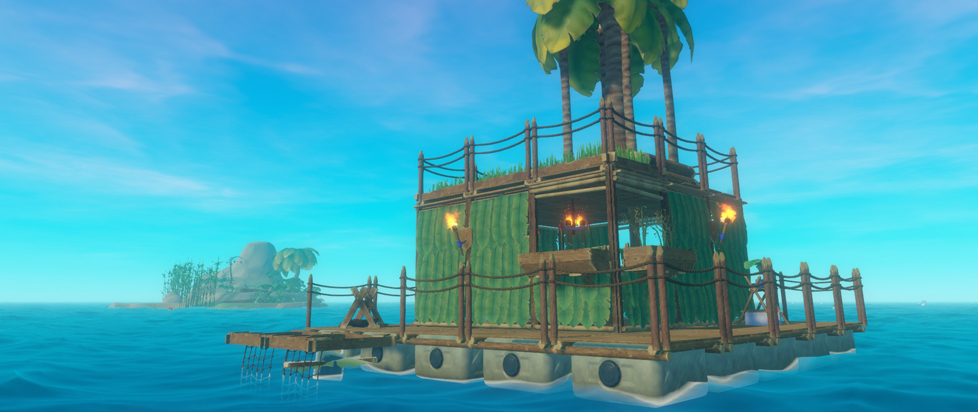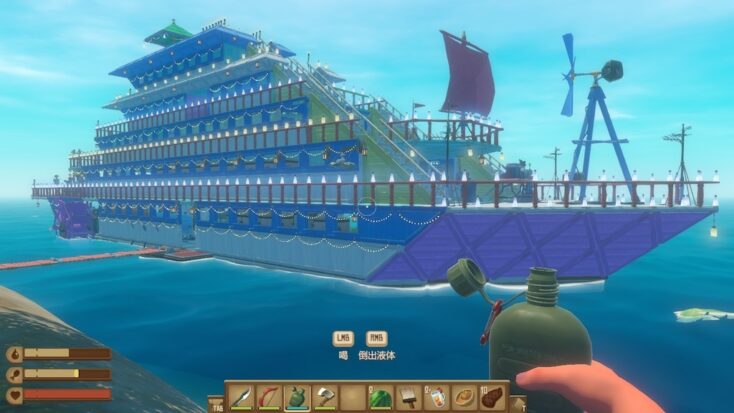
Space at Sea

This column is a reprint from Unwinnable Monthly #170. If you like what you see, grab the magazine for less than ten dollars, or subscribe and get all future magazines for half price.
———
What does digital grass feel like?
———
When I say that space is socially constructed, I usually think of the green places. Maybe this is a personal bias. The first time I encountered the concept was in anthropologist and archaeologist Barbara Bender’s case study of the train poster showing open English countryside punctuated with a single tree and describing it as “one of the best shows on earth” to be enjoyed while travelling through it – in first-class, of course.
The image is one of agricultural monoculture, the money that influenced it and the workers who made it disappeared from frame so that it can be captured as “a private view” for those paying to move through it without stopping. The imagined reader’s social experience of the space is entirely different from the landowner’s, which is different from the farm laborer’s, which is different from the local hiker excluded from the land, and so on.
This is where I first encountered the sociality of space, and where I continue to experience it, living on the border of that same English countryside. But playing Raft, I now think that maybe the clearest demonstration is actually in the sea. The oceans are a space of freedom, terror, traversal, piracy, exploration, exploitation, warfare, monsters, beauty, death and a thousand other things depending on their social context.
Perhaps this is because the oceans are inaccessible without some kind of social input. Even solo sailors carry with them the people who made their boats, their supplies, their maps. But more often your experience of the sea will depend entirely on what kind of boat you are in, and why. The ocean is a different place for the captain of the 17th century trade galleon and the passenger on the modern cruise liner; different again for a galley steward working 12-hour shifts on that very same ship.

In Raft, of course, the question of where you learned to build the raft and all the associated survival gear is elided. But the sociality of the seascape is nonetheless front and center, particularly playing in a group. There’s always more than one thing you could be doing in Raft; building new bits of the boat, looking for and exploring islands, hooking flotsam, processing materials, farming and cooking and so on.
The last of these is the one that I sink into, the rhythms of plant-water-harvest-cook-serve. And while our raft floats across an endless ocean underneath a beautiful, vast sky and my co-sailors explore scattered rocks, my space shrinks to a cyclical routine. Plant-water-harvest-cook-serve.
It wouldn’t matter if this raft wasn’t moving at all. The ocean is compressed down into one routine. Plant-water-harvest-cook-serve. In real life there would be worn paths along the route: soil to still to soil to kitchen. This is the space that is created by the cooking cycle; a necessary labor for being away from land made soothingly engaging by the tricks of gameplay.
Obviously, this being a game, and my being the potato farmer of my own volition, I also get to experience the space of Raft in other ways. I go to the trader’s shack, set high on a hill and adorned with Christmas-like fairy lights. We explore a giant yacht, run aground and dark. I watch the moon and the cotton candy pink sunrises. One of the best shows on earth.
When I’m a sailor, an explorer or an observer, Raft is a different social space. The game encourages moving between these social positions, demonstrating a fluidity of the spatial experience that isn’t often accessible in real life. The first-class train rider never becomes the farm worker, and while the worker might take the train, they won’t see the field as the advert invites them to.
But this fluidity is noticeable because head down, looking at the deck, pulling up vegetables from the dirt is the overwhelming spatial experience I have of Raft. The sea is infinite, and yet much of the time feels that it barely exists.
———
Jay Castello is a freelance writer covering games and internet culture. If they’re not down a research rabbit hole you’ll probably find them taking bad photographs in the woods.




